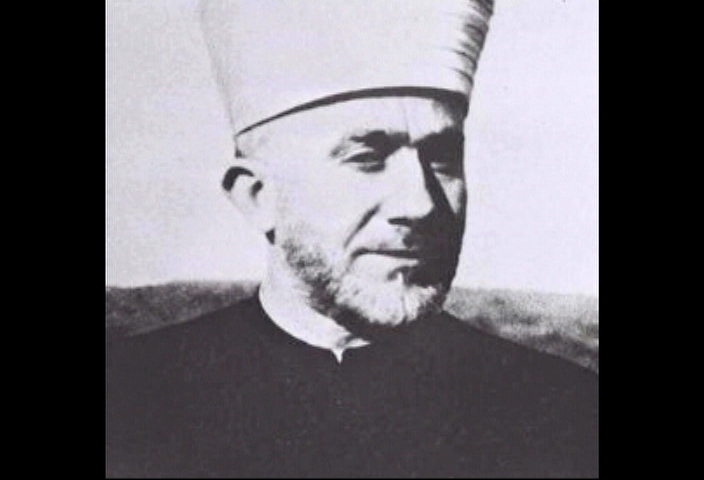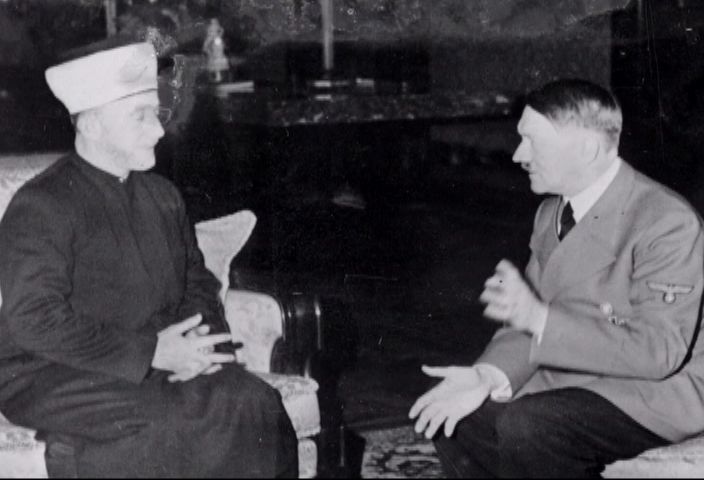Husseini's True Stance
By Osama Doumani, October 2008
Contents Of This Special Section On Obsession

It is true that Haj Amin Husseini was pro-German and had contacts with what are believed to be low-level German operatives. His pro-German stance represented an extant sentiment of a section of the Palestinian people at the time, certainly not a position held by all. Please keep in mind that his family was not so all-powerful in Jerusalem, nor were they without opposition represented by other equally powerful notables vying for leadership at this time, some of whom were pro-British.
Among the townspeople, the relatively educated folk, there existed a pro-German sentiment as well; I am not sure how widespread it was. Some even thought of Hitler as their savior. They dubbed him Abu-Ali -- a complimentary nickname given to people one admires, a nickname sometimes bestowed on neighborhood tough men, thugs. It even became popular for men to change the style of their moustaches to imitate Hitler's. I am sad to say this fashion included my own father, who had earlier fought with Allenby and spent the rest of his life (until our 1948 diaspora) working for the British administration. Just to conclude this personal point, I should emphasize that never, at any time, did my father, or those around him, have any notion of what Nazism was all about.
We need to distinguish between being pro-German and being Nazi or a Nazi sympathizer. My impression is that in
Europe, including Germany, people did not know that the Nazis were exterminating Jews, Gypsies, communists, and
others. So you can imagine the situation in Palestine in this connection. Most Palestinians in the 1930s were
still rural, illiterate or semi-literate people, living off the land. Even the townsfolk had no idea what Hitler
stood for or what Nazism was all about. They would have been horrified to learn that he classified them, along
with the Jews, toward the bottom of humanity! I even doubt that Husseini himself had any notion of these issues or
the actual events that were taking place in Europe.

Among the common people, to this day, mass organizing for political action to bring about change is not common. People believed in the notion of a savior, a just, strong leader who would bring about change and deliverance – the Nasser syndrome, if you will.
It was widely believed that Husseini's German connection was not an ideological stance. As a Muslim and, more so, as a mufti, it would be ludicrous to believe any connection deeper than opportunism. Husseini represented a strong anti-British sentiment at the time shared by many of his countrymen. After all, WWII began shortly after the Arab revolt in Palestine was brutally and cruelly put down by the British. I was told as a child that the British would hang an Arab if they found a knife on him!
We know that Husseini was pro-German and anti-British. As Jewish immigration became more threatening to Palestinian Arabs, anti-Jewish sentiments began to appear and strengthen. So it was that Husseini, manipulated both by the British and by German operatives, began his anti-Jewish pronouncements well into the '40s. Very young children would imitate Husseini, supposedly, waving a kind of bamboo riding crop and saying, "We will throw them back into the sea" (the Jews that is). Jewish immigrants and the British occupiers came to be linked together.
It is interesting to note that when people referred to Husseini and his bamboo stick, they did so sarcastically. Even the common man did not believe that the Jews and British would be defeated with the mufti's thin bamboo stick!
To conclude: was there a pro-German sentiment among many Palestinians? Yes, there was. Was it ideologically (pro-Nazi) motivated? No, not at all. Any attempt, therefore, to connect Islam, through the mufti's activities at the time, with Hitler's Nazism is a great stretch of the imagination, to say the least. Did an understanding of fascism exist in Palestinian society? Yes, it did; only among those ideologically sophisticated, such as members of the Communist Party, for example, both Jews and Arabs.